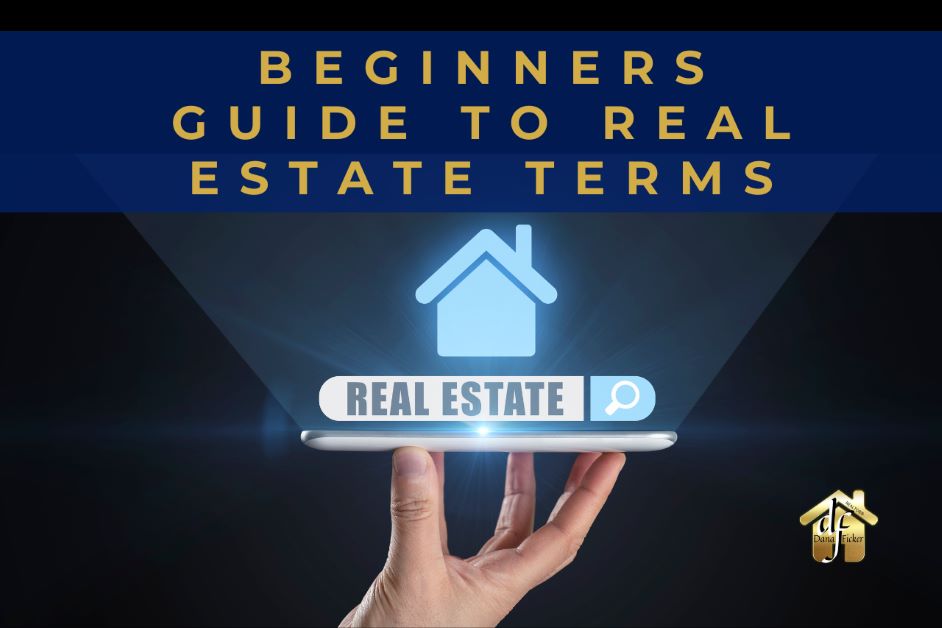
The Beginner’s Guide To Real Estate Terms
It can feel like real estate has its own language. After all, there is a reason agents take courses and need to become licensed!
And for a first-time buyer, I understand that it can be overwhelming and very confusing to keep track of all of this new information on top of choosing the home of your dreams and planning a move.
This is why I’ve created this quick and dirty list of real estate terms every first-time home buyer needs to know.

Let’s get started:
Adjustable Rate Mortgage (ARM) is a type of mortgage in which the interest rate on the outstanding balance varies (up or down) throughout the life of the loan.
After Repair Value (ARV) is an estimate, based on comparable properties near the subject property, of the value of the home after it has been repaired and remodeled.
Annual Percentage Rate (APR) Everything financed in your mortgage loan package (interest, loan fees, points, or other charges) is expressed as a percentage of the loan amount (usually slightly above the actual rate alone).
Appraisal determines a property’s market value. Only a licensed appraiser can pull a report of this information for you. This is the report a lender will use to determine whether or not to lend money to a borrower.
Closing Costs are paid at the actual sale of the house. The “closing” is when the title is transferred from the seller over to the buyer. The cost covers all of the fees that were incurred throughout the buying and selling process. A few examples of these fees are home inspection, appraisal, and escrow.
Comparative Market Analysis or CMA is a report pulled from a database your real estate agent has access to. This is then used to determine the offering and asking price of homes.
Contingency is when in order to move forward with a sale, there are specific requirements the buyer must complete first. Common contingencies are: waiting on an inspection, pre-approval, signing, or the prospective buyer needing to sell their present home.
Conventional Mortgage is a type of mortgage not insured by either the Federal Housing Administration (FHA) or the Department of Veterans Affairs (VA), and thus usually requires a 10 percent – 20 percent down payment. (HUD homes may be purchased with a conventional mortgage.)
Disclosures are required by law. But what are they? A disclosure means a seller has to inform potential buyers of any problems that would affect the value of the property.
Due Diligence is doing the work of fully understanding the property you are interested in before buying it. This includes obtaining insurance, reviewing all documents carefully, and walking the property.
Earnest Money is usually held in an escrow account and presents your commitment to the sale of a house you have made an offer on. Typically, the amount of down is between 1-3% of the asking price. It is called “good faith money.”
Escrow a neutral third party is used to handle transactions throughout the buy/selling process. They hold all related documents and funds until the day of the sale.
FHA Financing for a loan that will be insured against loss by the Federal Housing Administration – a part of the U.S. Depart of Housing and Urban Development (HUD). Such financing allows for a lower down payment than required by most lenders.
Homeowners Insurance protects the homeowner from “casualty” (losses or damage to the home or personal property) and from “liability” (damages to other people or property). Required by the lender and usually included in the monthly mortgage payment.
Inspection Report is a written record of a property’s condition, including the foundation, interior, roof, kitchen, and baths. During a home inspection, appliances, plumbing, and electrical work are tested. The heating and cooling are also inspected. This does not affect the monetary value of your home. this is a way for you to determine what state a home is in and if it is worth the financial investment to you.
Kick-out Clause gives the seller the option to continue showing a house after a buyer has made their offer but is slowing the process with the sale of their own home. The seller can then “kick-out” that offer if someone else puts in a more desirable and readily available one.
Loan Origination Fee is a fee charged by the lender for evaluating, preparing, and submitting a proposed mortgage loan.
Mortgage Insurance Premium (MIP) is a charge paid by the borrower (usually as part of the closing costs) to obtain financing, especially when making a down payment of less than 20% of the purchase price. (FHA-insured loan is an example.)
Points are an amount equal to 1% of the principal amount being borrowed. The lender may charge the borrower several “points” in order to provide the loan.
Property Taxes are taxes based on the assessed value of the home paid and paid by the homeowner for community services such as schools, public works, and other costs of local government. Paid as a part of the monthly mortgage payment.
Title Insurance Protects lenders and homeowners against loss of their interest in property due to legal defects in the title.
Title-Search is simply a search to pull up relevant information to the title of a house. It helps to determine the history of the home and if there are existing regulations in place that affect the property.
VA Loan is a loan guaranteed by the Department of Veterans Affairs against loss to the lender and made through a private lender. (HUD Homes may be purchased with a VA loan.)
Warranty is a binding promise that some product or service will be provided in the future.
If you’re looking to buy or sell a home in the St. Louis Metro East Illinois area and want a real estate agent that will look out for your best interest, please reach out to me via one of these optional links: Dana Ficker – Agent Contact Links


 Facebook
Facebook
 X
X
 Pinterest
Pinterest
 Copy Link
Copy Link


